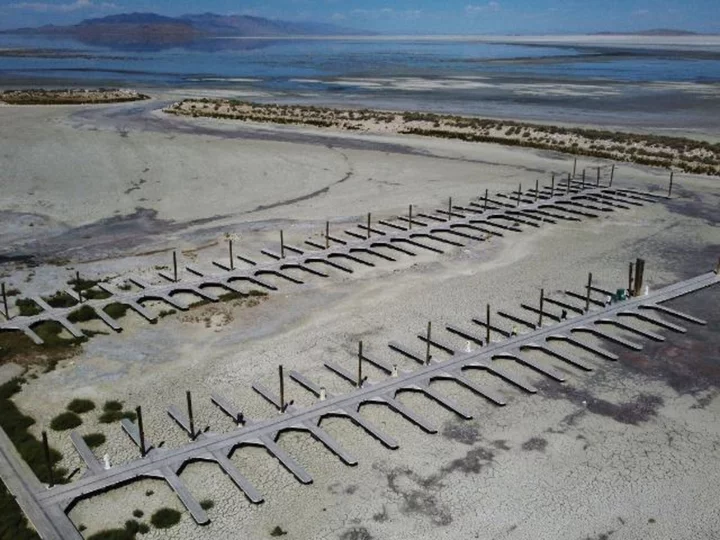A coalition of environmental groups and conservationists is suing the state of Utah for its alleged misuse of water and failing to protect the Great Salt Lake from the brink of "ecological collapse," according to a lawsuit filed Wednesday.
The lawsuit comes roughly nine months after nearly three dozen scientists and conservationists sounded the alarm that North America's largest terminal lake is facing "unprecedented danger," and that unless Utah lawmakers fast-tracked "emergency measures" to dramatically increase the lake's inflow by 2024, it would likely disappear in the next five years.
Environmental groups are now asking the court to step in, arguing the state is breaching its public trust obligation by continuing to divert much-needed water away from the lake.
The lake first hit a record low in 2021, then again in July 2022. And while an epic winter helped boost the water levels in April, it still was not enough to make up for the monthslong deficit.
If anything, it likely extended that five-year timeline for around another year, said Stu Gillespie, a senior attorney for Earthjustice, an environmental law firm representing the plaintiffs.
"But the state has not done anything to resolve the fundamental problem here, which is those excessive (water) diversions" away from the lake, Gillespie told CNN. "So, the longterm outlook is still the same dire predictions about ecological collapse and public health crisis."
According to the complaint, officials have continued to allow around 74% of upstream water to be diverted to farmers to irrigate alfalfa, hay and other crops, with a small part of the water being used for lawns and other decorative plants.
The Utah attorney general's office has not yet replied to a request for comment on the lawsuit.
The climate crisis has been making it increasingly difficult for the Great Salt Lake to bounce back, even in wet years. As temperatures get warmer, experts have seen evaporation and depletion exceed the amount of water that's making it into the lake.
And the impacts of the drying Great Salt Lake are already widespread. It threatens critical habitat for endangered species as well as the state's economy. From the mineral industry to agriculture and recreation, the Great Salt Lake contributes $1.3 billion to the annual economy, according to a state assessment.
If the lake continues to dry up, the economic toll would range from $1.7 billion to $2.2 billion each year, the assessment concluded.
The rapid drying of the lakebed also exposes toxic dust that threatens human health. When strong wind blows over the drying lakebed, it kicks up those tiny particles that can be inhaled, damage the lungs and exacerbate respiratory illness. These pollutants have been linked to health complications such as asthma, heart disease and chronic bronchitis.
In March, the Church of Jesus Christ of Latter-day Saints agreed to donate some of its water shares to the state of Utah for the Great Salt Lake, equivalent to more than 20,000 acre-feet, which it had historically used for agricultural purposes.
Gillespie said the contribution is just "a drop in the bucket," and that the state needs to be doing more to conserve water across the board.
"The fundamental point is that we're all in harm's way at this point — and that's really a clarion call for action," he said. "This is an amazing resource, and it needs to be protected."

